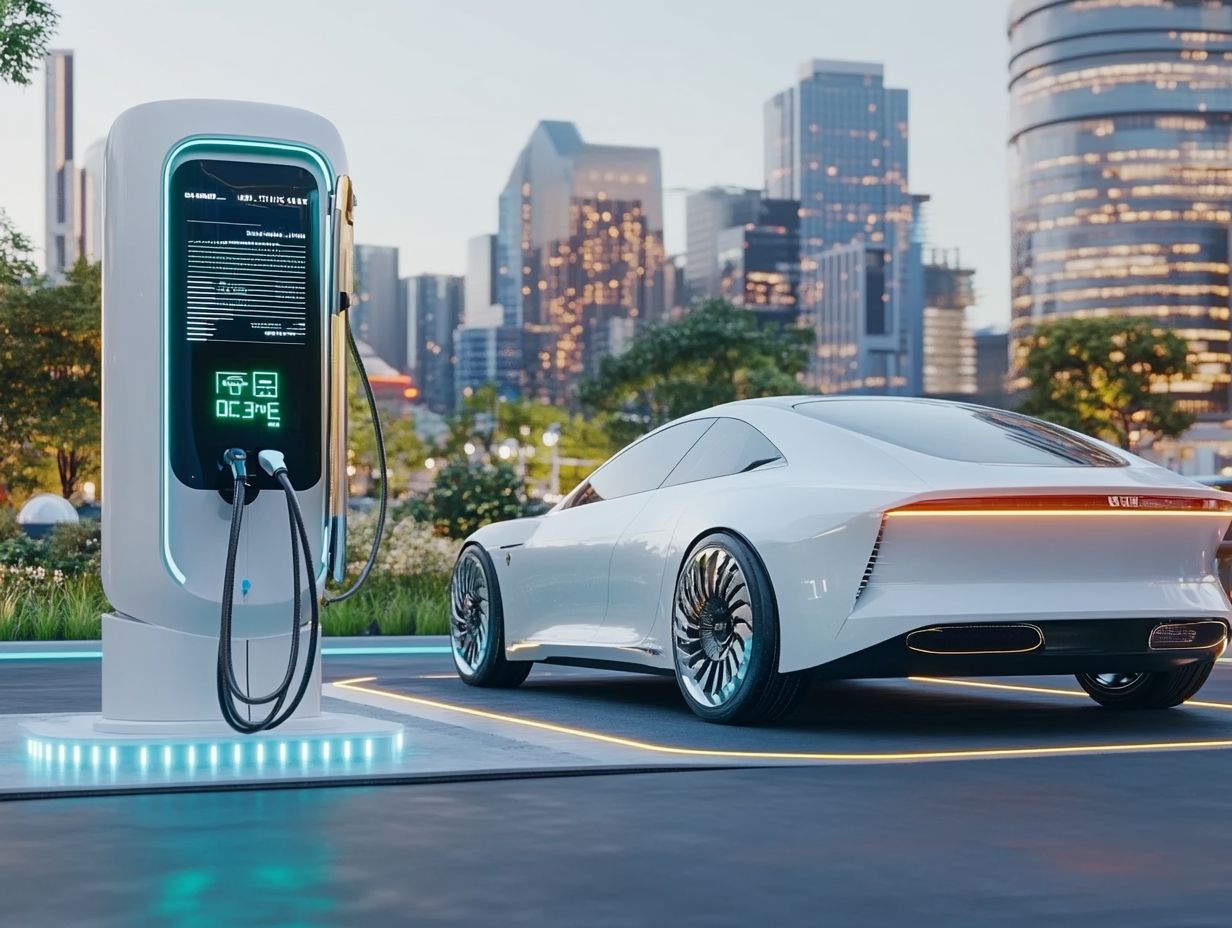Understanding Battery Life in Electric Vehicles
Battery life is an important part of electric vehicles (EVs), influencing everything from range to overall performance. As you rely more on this technology, understanding the factors that affect battery longevity becomes essential.
This exploration delves into the various elements impacting battery life, including environmental conditions, driving habits, and proper maintenance practices. It also covers effective methods for measuring battery performance, offers tips for extending its lifespan, and outlines best practices for replacement and recycling.
Engage with this information to elevate your EV experience!
Contents
- Key Takeaways:
- Why Battery Life is Important
- Factors Affecting Battery Life
- Measuring Battery Life
- Prolonging Battery Life
- Replacing and Recycling Batteries
- Frequently Asked Questions
- What is battery life in electric vehicles?
- How long do electric vehicle batteries last?
- What factors can affect battery life in electric vehicles?
- How can I extend the battery life of my electric vehicle?
- What happens when an electric vehicle battery needs to be replaced?
- Are there any warranties for electric vehicle batteries?
Key Takeaways:

- Environmental factors, driving habits, and proper maintenance all play a crucial role in the battery life of electric vehicles.
- Understanding the difference between range and state of charge is important in measuring battery life and predicting battery degradation.
- Prolonging battery life in electric vehicles can be achieved through simple tips and strategies such as proper charging and avoiding extreme temperatures.
Why Battery Life is Important
Battery life stands as a crucial element of electric vehicles (EVs), profoundly affecting their performance, reliability, and overall user experience. By understanding the sustainability of EV batteries, you can make informed decisions that influence maintenance costs and the long-term viability of your electric vehicle investment.
As technology progresses, the importance of battery management systems and efficient charging processes becomes ever clearer, playing a crucial role in shaping the future of the EV market.
Factors Affecting Battery Life
Several critical factors significantly influence the lifespan and degradation of electric vehicle batteries, ultimately affecting their performance and reliability.
Environmental conditions, battery management systems, and charging cycles are crucial for your EV battery’s lifespan. Get to know these elements to boost your EV’s longevity!
Environmental Factors
Environmental factors such as temperature and humidity play a significant role in the performance and lifespan of lithium-ion batteries, a type of battery commonly used in electric vehicles.
In regions with extreme heat, you may notice that battery efficiency takes a hit. Higher temperatures can speed up the chemical reactions within the cells, leading to increased degradation. On the flip side, if you find yourself in a cold climate, the charging process can become sluggish, requiring more time to reach optimal battery levels. These climatic variations call for strategic battery management practices to ensure consistent performance across different environments.
To enhance the longevity of your electric vehicle’s battery, effective monitoring and adaptive charging cycles are essential. By keeping the batteries operating within ideal thermal ranges, you not only contribute to their lifespan but also benefit from improved performance. Understanding these factors enables you to make informed decisions regarding vehicle maintenance and energy usage, ultimately leading to a more efficient and enjoyable driving experience.
Driving Habits
Driving habits significantly influence the health and longevity of an electric vehicle’s battery, ultimately impacting its overall performance.
Consider factors like acceleration, speed, and charging frequency they can greatly affect battery lifespan and efficiency. For example, if you frequently accelerate quickly, you may find yourself consuming more energy, which places extra strain on the battery. Likewise, maintaining higher speeds drains the battery more rapidly and can increase temperature, leading to thermal stress. Your charging habits matter too; consistently opting for fast-charging stations might diminish the battery’s overall capacity over time.
Understanding these dynamics is crucial for you. By adopting smoother acceleration patterns, driving at moderate speeds, and establishing regular charging routines, you can maximize your vehicle’s battery health. This not only enhances performance but also reduces maintenance needs in the long run.
Battery Maintenance

Proper battery maintenance is crucial for extending the lifespan of your electric vehicle’s battery and ensuring optimal performance. By adopting best practices, you can significantly boost the efficiency and longevity of your vehicle’s battery system.
Using appropriate charging techniques, like avoiding complete discharges and opting for gradual charging cycles, is often recommended. Monitoring your battery’s health with tools that check your battery’s condition will alert you to any potential issues. Regular maintenance checks, as advised by manufacturers and supported by community insights, provide a deeper understanding of your battery s overall condition.
Integrating these strategies not only helps you mitigate potential issues but also encourages an eco-friendly approach to your driving lifestyle.
Measuring Battery Life
Measuring battery life in electric vehicles requires a keen understanding of key metrics, such as range, state of charge, and various performance indicators that reflect battery health.
Accurate measurement is essential for optimizing your driving experience. Manufacturers also focus on these metrics to refine battery technology and extend longevity.
Range vs. State of Charge
Understanding the relationship between range and state of charge is essential for optimizing battery performance in your electric vehicle.
For many EV owners, grasping how these two metrics interact can enhance both their driving experience and the lifespan of their vehicle’s battery. Knowing how state of charge influences range allows you to plan journeys more effectively, easing anxiety about running low on battery.
Maintaining a moderate state of charge can improve energy efficiency, enabling longer trips on a single charge. This knowledge helps you implement strategies that protect against rapid battery depletion, ensuring peak performance while fitting seamlessly into your daily routine.
Battery Degradation
Battery degradation is an unavoidable process that influences the lifespan of electric vehicle batteries and shapes their performance over time.
If you’re concerned about how quickly your battery is losing capacity, it s essential to explore the underlying causes. Charging cycles, referring to the number of times a battery is charged and discharged, significantly impact longevity. Environmental factors, like extreme temperatures, can also worsen performance decline.
Manufacturers underscore the importance of certain practices such as avoiding full charges and deep discharges to help mitigate degradation. Understanding these factors empowers you to make informed decisions, ultimately enhancing your battery’s longevity.
Prolonging Battery Life
Prolonging the battery life of your electric vehicle involves a blend of strategic practices and diligent maintenance. By implementing targeted strategies, you can supercharge your battery s performance and longevity, ensuring that your investment in electric vehicles pays off.
Tips and Strategies

Implementing effective tips and strategies can significantly enhance the lifespan and performance of your electric vehicle batteries.
To achieve this, consider developing a routine that aligns your charging times with off-peak energy hours. This saves you money and helps maintain optimal battery health. Regularly check your battery’s state of charge and avoid extremes like depleting it to 0% before charging. This simple practice greatly contributes to longevity.
Regular inspections of the battery management system are crucial, allowing you to address any issues before they escalate.
Start implementing these strategies today to maximize your electric vehicle battery’s performance!
Replacing and Recycling Batteries
Replacing and recycling electric vehicle batteries are essential steps in maintaining battery health and promoting sustainability. These actions ultimately benefit both the environment and the economy.
By recognizing the right moments to replace a battery and understanding the appropriate recycling methods, you can make informed choices that resonate with eco-friendly practices.
When to Replace a Battery
Knowing when to replace your battery is crucial for ensuring best performance and longevity of your electric vehicle.
Watch for signs that can turn your driving experience from seamless to frustratingly inconvenient. For example, a decline in your vehicle’s range, slower acceleration, or changes in power can signal early battery wear.
Pay attention to warning lights on your dashboard; many vehicles have specific alerts indicating battery issues. Reviewing your warranty terms is also wise, as they often cover the battery for several years, allowing for replacements at little or no cost to you.
Regular maintenance checks provide deeper insights into your battery s health. This ensures that you can enjoy the full functionality of your vehicle.
Proper Disposal and Recycling Methods
Proper disposal and recycling methods for electric vehicle batteries are crucial for ensuring environmental sustainability and effective resource management.
These batteries contain valuable materials that can be repurposed. Communities are increasingly collaborating on initiatives for responsible battery disposal, guided by local regulations.
Stakeholders are key players in ensuring that batteries are recycled ethically, minimizing their environmental footprint. By promoting awareness and education around battery end-of-life management, they contribute to a circular economy, fostering practices that protect the planet and enhance the availability of essential materials for future technologies.
Frequently Asked Questions
What is battery life in electric vehicles?

Battery life in electric vehicles refers to the time a battery can provide power before needing recharge or replacement. Understanding the lifespan of an EV battery is an important factor when purchasing an electric vehicle, as it impacts the overall range and performance.
How long do electric vehicle batteries last?
This varies depending on the vehicle’s make and model, as well as driving habits and environmental conditions. On average, most electric vehicle batteries last between 8 to 10 years or around 100,000 miles.
What factors can affect battery life in electric vehicles?
The main factors impacting battery life include temperature, driving style, and charging habits. Extreme temperatures, rapid acceleration, and frequent fast charging can all decrease battery life over time.
How can I extend the battery life of my electric vehicle?
To extend your electric vehicle’s battery life, practice good charging habits, avoid extreme temperatures, and drive conservatively. Regular vehicle maintenance and keeping the battery at a moderate charge can also help.
What happens when an electric vehicle battery needs to be replaced?
Replacing an electric vehicle battery can be costly. The average cost ranges from $5,000 to $15,000. However, as battery technology improves, replacement costs are expected to decrease.
Are there any warranties for electric vehicle batteries?
Many electric vehicle manufacturers offer warranties for their batteries, typically lasting 8 to 10 years or a specific number of miles. It is essential to check your vehicle’s warranty information to understand coverage and duration.
Start checking your battery health today to ensure a smoother ride tomorrow!






